
Epistemology & Philosophy of Science-Epistemologiya i Filosofiya Nauki
metrics 2024
Exploring the Intersections of Philosophy and Science
Introduction
Epistemology & Philosophy of Science-Epistemologiya i Filosofiya Nauki is a prestigious journal published by the Russian Academy of Sciences - Institute of Philosophy, dedicated to advancing the discourse in the fields of epistemology, philosophy of science, and related disciplines. With a distinguished presence in academia, this journal is recognized for its exceptional contributions, evident through its categorization as a Q2 journal in Arts and Humanities and Philosophy, and a Q1 journal in Cultural Studies. Covering an expansive scope from 2017 to 2023, it facilitates a vital dialogue among scholars and professionals aiming to explore the intersections of knowledge, culture, and education. Although currently not open access, the rigorous peer-review process ensures that only high-quality research is published, enriching the intellectual landscape. The journal's commendable rankings in Scopus, particularly in Arts and Humanities and History and Philosophy of Science, reflect its commitment to scholarly excellence. For researchers, educators, and students, Epistemology & Philosophy of Science serves as an essential resource for understanding and contributing to the ongoing philosophical dialogues that shape our comprehension of scientific inquiry.
Metrics 2024
 0.24
0.24 0.20
0.20 0.20
0.20 10
10Metrics History
Rank 2024
Scopus
JCI (Web Of Science)
Quartile History
Similar Journals
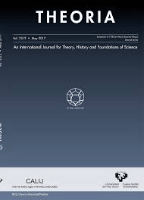
THEORIA-REVISTA DE TEORIA HISTORIA Y FUNDAMENTOS DE LA CIENCIA
Pioneering Insights in Philosophy and History of ScienceTHEORIA-REVISTA DE TEORIA HISTORIA Y FUNDAMENTOS DE LA CIENCIA, published by the Servicio Editorial Universidad del País Vasco, is a leading open access journal dedicated to advancing the fields of History, Philosophy of Science, and related disciplines since its inception in 2003. With a robust impact factor placing it in the esteemed Q1 and Q2 quartiles in its respective categories, this journal serves as a crucial platform for researchers, professionals, and students who are engaged in profound discussions and analyses of scientific foundations and historical contexts. Based in Spain, THEORIA has consistently demonstrated its commitment to scholarly excellence, achieving notable rankings in Scopus, particularly in the fields of Arts and Humanities, where it holds a rank of #169 in Philosophy and #59 in History and Philosophy of Science. The journal not only allows immediate open access to its diverse range of articles, fostering global knowledge dissemination, but also aims to bridge connections across varied philosophical inquiries and historical explorations within science. Join the dialogue today in shaping the future understanding of our scientific heritage.

PHILOSOPHY OF SCIENCE
Challenging Perspectives, Shaping InquiryPHILOSOPHY OF SCIENCE, published by Cambridge University Press, serves as a premier journal at the intersection of history, philosophy, and science, making significant contributions to our understanding of scientific inquiry and its historical contexts. With an impressive impact factor reflected in its 2023 Category Quartiles—ranking Q1 in History, Q1 in History and Philosophy of Science, and Q1 in Philosophy—this journal stands out as a vital resource for researchers, professionals, and students alike. Operating without Open Access, it encourages the dissemination of groundbreaking ideas from 1949 through 2024, illustrated by its robust Scopus rankings, including a remarkable 98th percentile in the History category. Based in the United Kingdom at the prestigious Cambridge campus, PHILOSOPHY OF SCIENCE is committed to fostering scholarly dialogue and advancing critical thought in the philosophy of science.

ERKENNTNIS
Advancing the frontiers of philosophy and logic.ERKENNTNIS, published by SPRINGER, is a premier academic journal that has been advancing the study of philosophy and logic since its inception in 1919. With its esteemed ranking in the Q1 quartile for both categories as of 2023, it stands at the forefront of scholarly discourse, earning an impressive rank of #104 in the field of philosophy and #13 in logic according to the Scopus rankings. This influential publication not only contributes to the theoretical underpinnings of these disciplines but also fosters a vibrant exchange of ideas among researchers, professionals, and students alike. While it does not offer open access to its articles, the journal's esteemed reputation and rigorous peer-review process ensure that all published works maintain the highest standards of quality and intellectual inquiry, making ERKENNTNIS an essential resource for anyone engaged in these critical areas of study.

Rhizomata-A Journal for Ancient Philosophy and Science
Delving Deep into the Intersections of Philosophy and ScienceRhizomata - A Journal for Ancient Philosophy and Science is a key academic publication dedicated to exploring the intricate intersections of ancient philosophical thought and scientific inquiry. Published by WALTER DE GRUYTER GMBH, this journal has established a significant presence in the field since its inception in 2013, with its convergence years extending to 2024. With a strong Q2 ranking in both the History and Philosophy of Science and Philosophy categories, it offers rigorous peer-reviewed articles that engage with the historical context and evolution of scientific ideas. The journal enjoys a commendable standing in Scopus rankings, positioned at 310 out of 806 in Philosophy, and 126 out of 223 in History and Philosophy of Science, showcasing its relevance and impact within these disciplines. While currently not an Open Access publication, the journal is instrumental for researchers, professionals, and students eager to delve into the foundational theories that have shaped modern scientific discourse. Join the dialogue and contribute to the vibrant academic community by engaging with Rhizomata, where ancient wisdom meets contemporary thought.
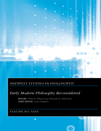
Midwest Studies in Philosophy
Exploring diverse perspectives in contemporary philosophy.Midwest Studies in Philosophy is a distinguished journal published by the Philosophy Documentation Center, dedicated to advancing scholarly research in the field of philosophy. With its ISSN 0363-6550 and E-ISSN 1475-4975, this journal has been a fundamental resource for researchers, professionals, and students interested in philosophical discourse since its inception. Covering diverse philosophical topics from 1976 to 2019, it boasts a respectable Scopus rank of #197/644 within the Arts and Humanities: Philosophy category, placing it in the 69th percentile. Although the journal is not Open Access, its rigorous selection of articles continues to influence contemporary philosophical thought, providing a crucial platform for emerging voices and established scholars alike. Midwest Studies in Philosophy strives to contribute vital insights and innovative perspectives, making it an essential resource for anyone engaged in philosophical inquiry.

SYNTHESE
Fostering innovative thought for a complex world.SYNTHESE is a prestigious academic journal published by Springer, renowned for its contributions to the fields of Philosophy and Social Sciences. With a distinguished history dating back to its inception in 1936, this journal continues to thrive, offering a platform for innovative and critical discourse. Recognized for its excellence, SYNTHESE holds a remarkable Q1 quartile ranking in both Philosophy and Social Sciences (miscellaneous) as of 2023, placing it within the top tier of scholarly publications. Its impressive Scopus rankings further underscore its influence, boasting a rank of #48 out of 806 in Philosophy and #70 out of 275 in General Social Sciences, thereby reflecting a 94th percentile in the arts and humanities. The journal's scope encompasses a wide array of interdisciplinary and philosophical inquiries, making it a vital resource for researchers, professionals, and students seeking to deepen their understanding of complex social issues. With access options that promote scholarly connectivity, SYNTHESE is committed to advancing knowledge and fostering intellectual engagement within the global academic community.
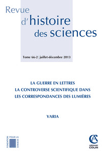
Revue d Histoire des Sciences
Bridging the Gap Between Past Discoveries and Future Innovations.Revue d'Histoire des Sciences is a distinguished academic journal published by Armand Colin, focusing on the intricate interplay of history and philosophy within the sciences. Since its inception in 1973, the journal has served as a vital platform for researchers, scholars, and students interested in exploring the historical dimensions of scientific development. With an ISSN of 0151-4105 and an E-ISSN of 1969-6582, this journal is recognized within the academic community, achieving a modest 2023 Scopus ranking of Q3 in History and Philosophy of Science, positioning it within the 41st percentile of its category. The journal offers a prestigious space for rigorous discourse, critical analysis, and innovative research aimed at advancing our understanding of the scientific enterprise's past. While it operates under a traditional access model, the ongoing commitment to rich scholarly content ensures that the contributions will resonate with those dedicated to the intersections of history, science, and philosophy, providing insights into how historical context shapes scientific inquiry and advancement.

Constructivist Foundations
Advancing Interdisciplinary Insights in Learning and CognitionConstructivist Foundations is a distinguished academic journal dedicated to exploring the intersection of constructivist theories and interdisciplinary applications. Established in 2010 and published by ALEXANDER RIEGLER in Belgium, this journal aims to provide researchers, educators, and professionals with a platform to disseminate innovative ideas about learning, cognition, and scientific philosophy. With a focus on artificial intelligence, cognitive neuroscience, education, and the history and philosophy of science, Constructivist Foundations has made strides in contributing to meaningful discussions within these Q2 and Q3 ranked fields. Although it currently holds a Q4 status in several areas, it plays a crucial role in fostering knowledge and dialogue among scholars, thereby enhancing the understanding of constructivist principles across various domains. With robust academic engagement and open access options, this journal continues to shape the future of educational and cognitive research.
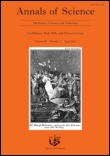
ANNALS OF SCIENCE
Connecting Past Discoveries with Future PhilosophiesANNALS OF SCIENCE, published by Taylor & Francis Ltd, is a pivotal journal in the field of the History and Philosophy of Science, as evidenced by its Q3 categorization and a respectable Scopus rank of 99 out of 223, placing it in the 55th percentile among its peers. With a rich history dating back to its initial publication in 1936, the journal has made significant contributions to scholarly discourse, providing a platform for researchers and academics to explore the intricate connections between scientific developments and philosophical inquiries. The journal's commitment to rigorous academic research ensures that it remains a vital resource for professionals, educators, and students dedicated to understanding the evolution of scientific thought. Although it operates under traditional subscription models, the journal's importance in shaping modern scientific discussions cannot be overstated, making it an essential read for those engaged in the multifaceted study of science's history and philosophical implications.
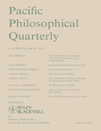
PACIFIC PHILOSOPHICAL QUARTERLY
Innovating Ideas, Inspiring MindsWelcome to the PACIFIC PHILOSOPHICAL QUARTERLY, a leading journal in the field of philosophy, published by Wiley. With an impressive impact factor and ranked in the top 15% of its category (Q1 in Philosophy), this esteemed journal has become a vital source for scholars and practitioners alike. Established in 1996, the journal presents groundbreaking articles that explore contemporary philosophical issues, ensuring its relevance through converged contributions up to 2024. With robust Scopus rankings, including a position of #122 out of 806 in the Arts and Humanities category, the quarterly serves as a platform for innovative ideas and rigorous debates in the philosophical community. Though it does not offer open access, its insights are invaluable for researchers, professionals, and students eager to deepen their understanding of philosophical discourse.